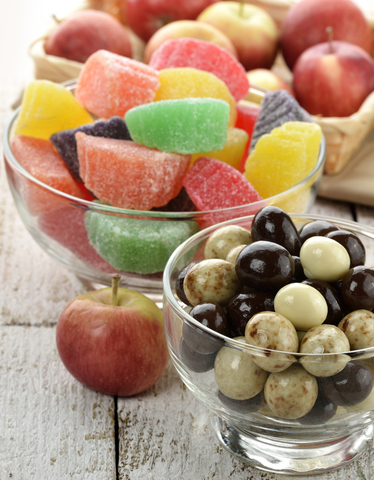February 9th, 2022

The Valentine shopping list is traditional and simple: Flowers. Candy. But if your Valentine is in braces this year, suddenly your choices become more complicated. No need to worry! Dr. Kevin Mancini and our Hampstead, NC and Jacksonville, NC team have some sweet suggestions that are both braces-friendly and Valentine-approved.
First, let’s look at some options where Cupid’s arrow has missed the mark.
- Caramels—these sticky treats are difficult to clean from orthodontic work, and sticky, chewy foods can even cause damage to wires and brackets.
- Chocolate covered nuts—hard foods such as nuts can break or bend wires and brackets.
- Assorted chocolates—a confectionary minefield! There are bound to be some caramels and nuts in there somewhere, hiding beneath an innocent coat of chocolate, just waiting to ruin your Valentine’s evening.
- Other candies such as taffy, licorice, hard candy? No, no, and no. Remember, anything sticky, chewy, or hard is on the “Loves Me Not” list.
So, which chocolate treats won’t break hearts or braces?
- Soft truffles—if it’s not Valentine’s Day without a be-ribboned box of chocolates, choose soft truffles to fill it.
- Chocolate mousse—the perfect end to a romantic dinner.
- Chocolate covered strawberries—it’s a special occasion treat that won’t mistreat braces.
- Rich chocolate cake—always a delightful indulgence, and even better if it’s in the shape of a heart.
If your Valentine is not a chocolate fan, there are other sweet treats that are delicious alternatives.
- Cheesecake can be topped with (pitted!) cherries to celebrate in holiday-appropriate color.
- Soft heart-shaped cookies will be even more romantic with decorative icing—add your initials for a personal touch.
- Select an array of frozen yogurt, ice cream, or gelato in different shades of pink.
- Macarons also come in a variety of pink and red shades—but make sure this confection is on your Valentine’s braces-friendly list!
Of course, you can celebrate the day without sugary tributes. A single flower, watching your favorite movie together or, best of all, a heartfelt card or letter are all wonderful ways to show you care. But if it’s just not the same holiday without a sweet treat, try some of our suggestions. Your Valentine will appreciate your thoughtfulness.
February 2nd, 2022

At Mancini Orthodontics, we know orthodontic emergencies are neither convenient nor timely. If you are a patient of record, Dr. Kevin Mancini and our team are more than willing to see you after hours or over the weekend. As a general rule, you should call our Hampstead, NC and Jacksonville, NC office when you experience severe pain or when you have a painful appliance problem that you can’t take care of yourself. We’ll be able to schedule an appointment to resolve the problem. If you have an orthodontic emergency after regular office hours, please give us a call and follow the emergency prompts to contact one of our doctors.
January 26th, 2022

Now that you have braces, it is more important than ever to maintain good oral hygiene during your treatment, as Dr. Kevin Mancini will tell you. While we trust you will continue brushing and flossing on a regular basis throughout your treatment at Mancini Orthodontics, you also have to mindful of what you eat. While all those sweet, sour, and sticky candies may taste great, these treats can actually damage your teeth and braces!
Sour candies can be acidic to your teeth, and actually wear down the enamel that protects them, resulting in tooth decay and cavities. If you do indulge in eating these candies at some point during your treatment, be sure to wash your mouth out with water, drink milk or eat a few slices of cheese. These foods will help neutralize the acid in your mouth.
Besides cavities and tooth decay, many people do not realize that good oral health and hygiene are important to your overall health, too; researchers have discovered the connection between periodontal disease and other major health concerns, such as heart disease. Therefore, it is important to maintain a good oral hygiene routine just as you did before your braces. This includes visiting your dentist here in Hampstead, NC and Jacksonville, NC every six months, brushing and flossing daily, and using an antibacterial mouthwash, as well as visiting Dr. Kevin Mancini for your regular adjustment appointments.
For more questions about foods you should avoid while wearing braces, or if you have any general questions about your treatment, we encourage you to give us a call, ask us at your next adjustment appointment or ask us on Facebook!
January 19th, 2022

Nowadays, many adults are taking advantage of getting straighter teeth with braces. Dr. Kevin Mancini and our team love to help patients create the dazzling, confident smile they’ve always wanted.
Our adult patients usually fall into two categories: some had braces in the past but didn’t wear their retainers, while others are brand-new to wearing braces. Either way, both groups want the same thing: straighter teeth and a beautiful smile!
You will have several options for getting braces, depending on your financial situation and how quickly you would like your treatment to finish. Traditional metal braces are a less-expensive option and can help people who have severely crooked teeth. But many adults may not prefer this option because they dislike the appearance of metal brackets.
If you’re concerned about how you’ll look, we offer clear ceramic braces that aren’t as visible. These are more expensive than metal braces, and patients need to be careful with colored drinks that can stain them, such as coffee or red wine.
Another popular option is a clear aligner treatment called Invisalign®. This type is practically invisible; it uses a series of aligners that are customized to fit your teeth. The process of straightening your teeth can last anywhere from three to 18 months. For people who have extreme bite problems or crowded teeth, a different method may work better.
Don’t hesitate to call our Hampstead, NC and Jacksonville, NC office today to set up a consultation. Dr. Kevin Mancini will help you choose the best option so you can be on your way to a straighter, more confident smile!




